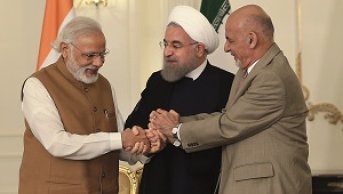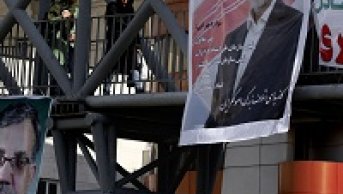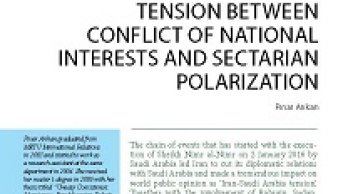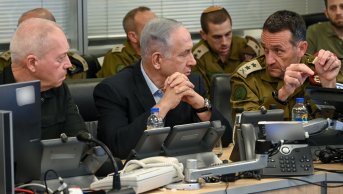Iranian President Hassan Rouhani’s Visit to Turkey and Its Aftermath
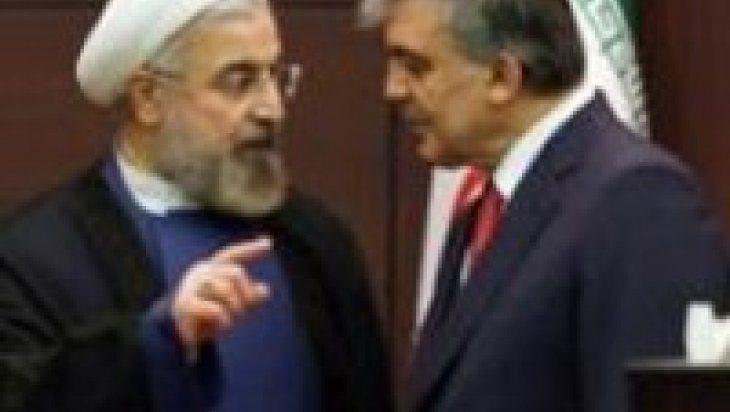
Iranian President Hassan Rouhani, who was elected to office in June 2013 and referred to as ‘moderate’ among the political currents inside Iran, paid an official visit to Turkey on 9-10 June 2014 upon the invitation of Turkish President Abdullah Gül. Accompanied by ministers, high level bureaucrats, and business people, Rouhani’s visit was important in underlining the will of the two countries to develop bilateral relations.
Turkish regional foreign policy has long been centered on possibilities of cooperation rather than problems between its neighbors and regional countries, and has been making use of opportunities to develop bilateral relations. Iranian administration under the presidency of Hassan Rouhani has also been expressing a desire for developing cooperative relations instead of conflictual, since he assumed power. Although, especially with regard to the Syrian crisis, there have been disagreements in regional issues and differences between the policies pursued, the similar approach of two countries in foreign policy that is based on dialogue has provided a favorable ground for the meeting of Turkish and Iranian governments.
Steps Towards Cooperation
Within this framework, the first day of the visit was marked by meetings with the leaders of the two countries and the meetings of delegations. On the second day, the leaders of the two countries attended a Turkey-Iran business forum and met with businessmen. The most prominent event of the visit was the first meeting of Turkey-Iran High Level Strategic Cooperation Council (HLSCC). The decision for establishment of this council was taken during a one-day visit of Iranian Foreign Minister, Javad Zarif, to Turkey on 4 January 2014, upon the invitation of Foreign Minister Ahmet Davutoğlu. Later, a joint declaration was signed between the two countries during the official visit of Prime Minister Tayyip Erdoğan to Iran on 28-29 January 2014; the first step was thusly taken. The first meeting of this council was held during Rouhani’s visit to Turkey. Seven ministers from each country attended this meeting and they discussed bilateral relations as well as regional developments. The two sides emphasized the importance of the development of economic and trade relations and underlined their determination to increase the trade volume between the two countries to 30 billion dollars by 2015. Within this framework, issues of financial cooperation, cooperation in tourism, mutual encouragement and protection of investments were discussed.
Following the HLCC meeting, the governments of Turkey and Iran issued a joint declaration. Besides the emphasis on determination to develop bilateral relations, regional issues were also addressed in this declaration. Both countries underlined their support for a Middle East free of nuclear weapons and all other weapons of mass destruction. Moreover, the two countries declared their commitment to strengthen their cooperation in the fight against terrorism in all its forms and manifestations: transnational organized crime, narcotics, arms and human trafficking as well as migrant smuggling. Both sides acknowledged that violent extremism in all its forms and manifestations as well as all forms of sectarianism and violence in regional conflicts constitute some of the most serious threats to international peace and security. Within this framework, Turkish support for the initiative of Hassan Rouhani, for ‘A World against Violence and Extremism (WAVE)’, adopted by the United Nations General Assembly on 18 December 2013, and Iranian support to the candidacy of Turkey to the UN Security Council non- permanent membership for the term 2015-2016 were emphasized.
Regarding the recent developments in the region including Syria, Iraq and Afghanistan and the wider international arena, the two sides expressed their resolution in finding political solutions to the ongoing conflicts in accordance with the legitimate rights of the peoples. Ankara and Tehran agreed upon cooperation in extending humanitarian assistance to people in need. In this joint declaration, Turkey and Iran also expressed their support for the recently established Palestinian national unity government and they called for support with the establishment of the State of Palestine with Al-Quds Al-Sharif as its capital.
In addition, cooperation acts in various fields were signed during the visit. These included: a memorandum of understanding between standardization institutes of two countries, a memorandum of understanding between Turkish Ministry of Transport, Maritime Affairs and Communications and Iranian Ministry of Communication and Information Technologies, a memorandum of understanding between Ministries of Finance regarding development of cooperation in administration of state immovables, Tourism Cooperation Enforcement Programme (2014-2017), Historical and Cultural Heritage Cooperation Enforcement Programme (2014-2016), Exchange Programme in Cultural, Educational, Scientific, Youth, and Sports Affairs (2014-2017), a memorandum of Understanding regarding a Joint Film Production, Cooperation Act in Population Affairs, and two protocols amending joint use of some border gates.
Iranian nuclear programme, which has become an international issue not only due to sanctions but also with the meetings between P5+1 countries, and indirectly with the US, and Iran since last November, was also on the agenda of the visit. Turkey once again reiterated its support for the right of peaceful use of nuclear energy by the regional countries and underlined its opposition to weapons of mass destruction in the region. Turkey expressed its pleasure with the level the negotiations were carried out with the P5+1 countries and its support for the conclusion of the negotiations with total lifting of the sanctions imposed on Iran.
Contentious Issues
Despite steps taken for the development of bilateral relations during Rouhani’s visit to Turkey, an agreement could not yet be reached regarding some controversial issues. The most important of these issues are the disagreement between the two countries on the price of natural gas and their respective Syria policy. The largest trade item with Iran is Turkish imports of oil and natural gas. However, a disagreement had occurred in the price of natural gas that Turkey imports from Iran and Turkey applied to the International Court of Arbitration in last January because of the high price of Iranian natural gas. It is stated that this issue was discussed during the visit but no agreement could be reached. However, an Iranian delegation will come to Turkey to discuss this issue next week and the energy ministers of the two countries will continue negotiations to increase prospects for the solution of the problem among the two countries.
The discrepancy between Turkey and Iran regarding Syria has remained. As a matter of fact, expecting a compromise on this matter is not realistic. Although Iran expressed its disapproval of the slaughter by the Assad regime of its citizens, it continues to emphasize the strategic importance of Syria for Iran. Syria taking a side with Iran in the region is a security matter for Iran. Therefore, expecting Iran to be in opposition to Syrian government is not a realistic view. Hence, at the press conference with Prime Minister Erdoğan, Rouhani said that he had congratulated Bashar Assad for his re-election as president in June, the third elections in Syria. However, the radical elements that are growing stronger in Syria and in western Iraq are a common threat for both countries. Although not being directly about the Syrian crisis, the messages concerning a common action against radicalism threat in the region could be regarded as a sign that the two countries will continue to talk about Syria.
In conclusion, Iranian President Hassan Rouhani’s visit to Turkey, which was the first official visit since 1996, has been an important development in the bilateral relations. Despite its importance, this visit has come out as one of the regular steps in the attempt to develop bilateral relations, as far as the outcomes are concerned. Notwithstanding issues of controversy, continuation of this regularity and maintenance of dialogue is beneficial to the two countries from a regionalist perspective.


